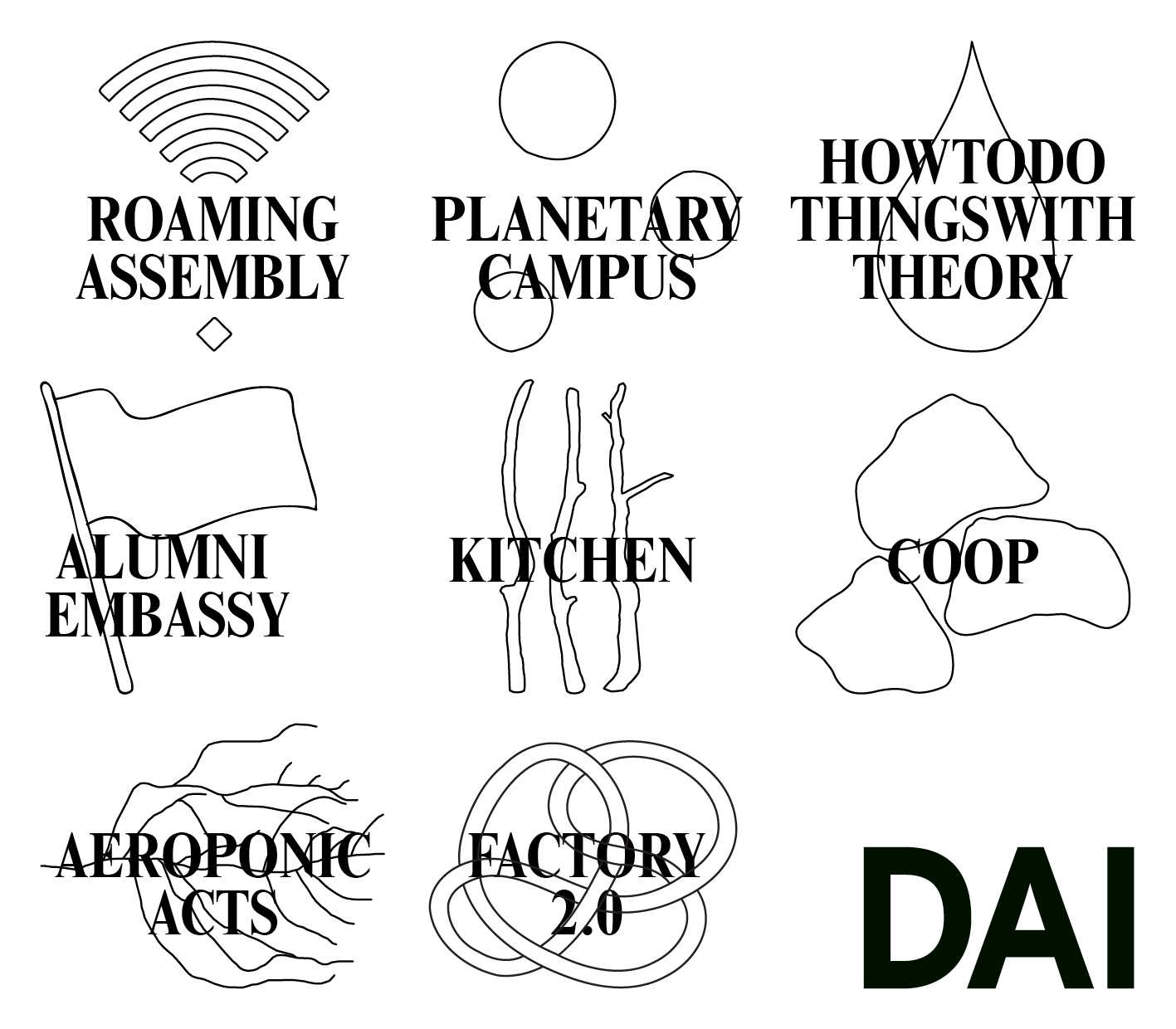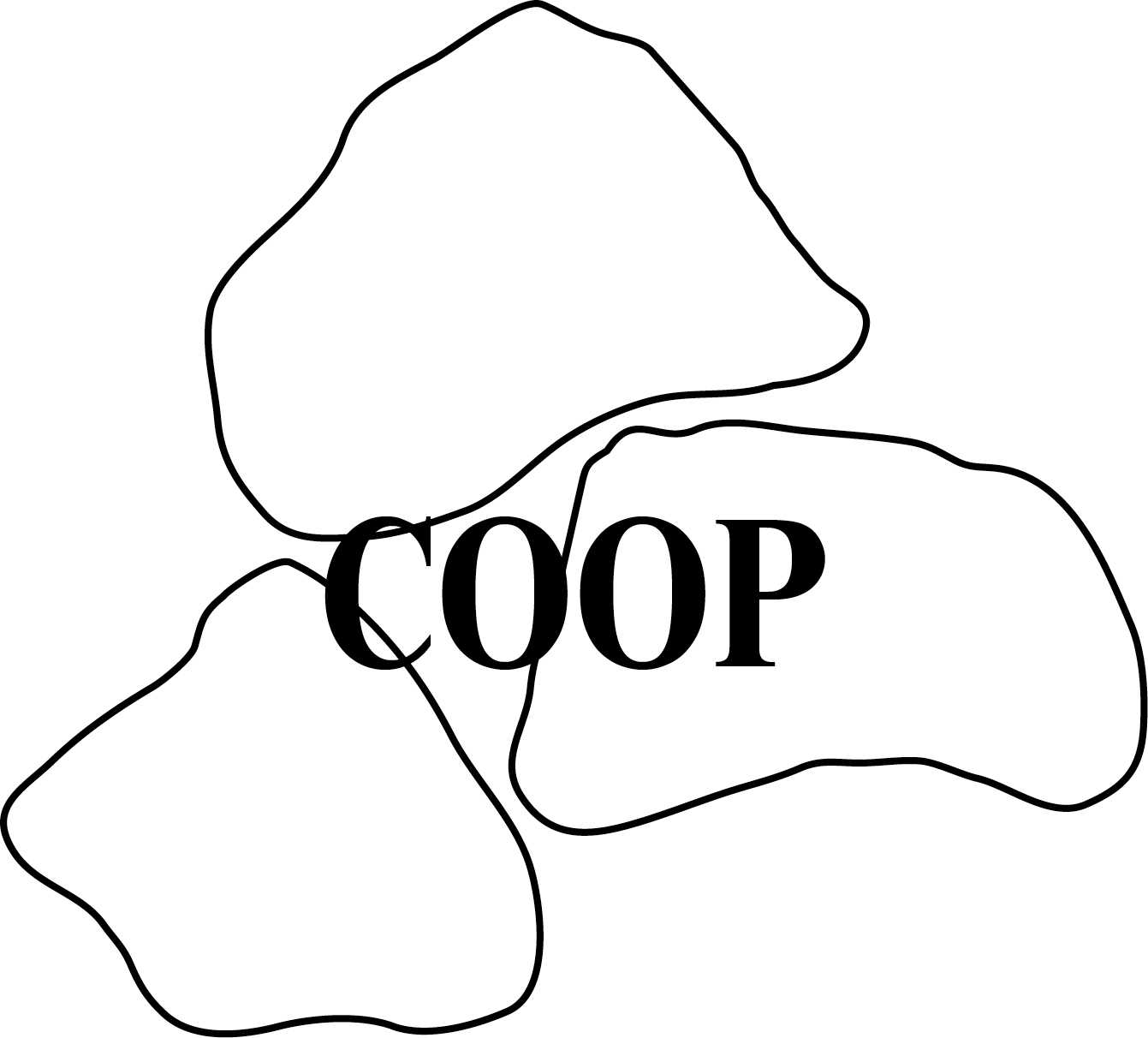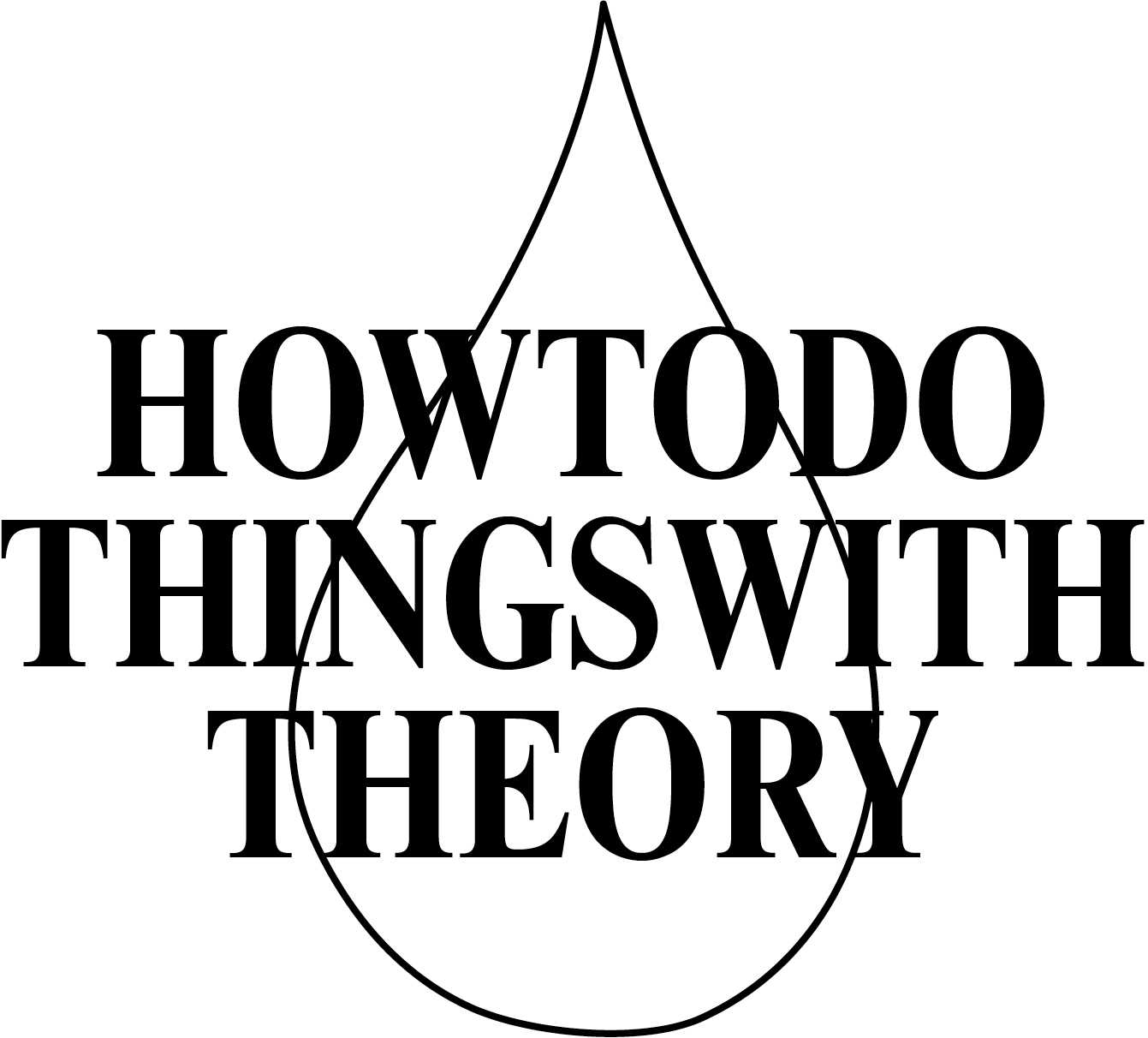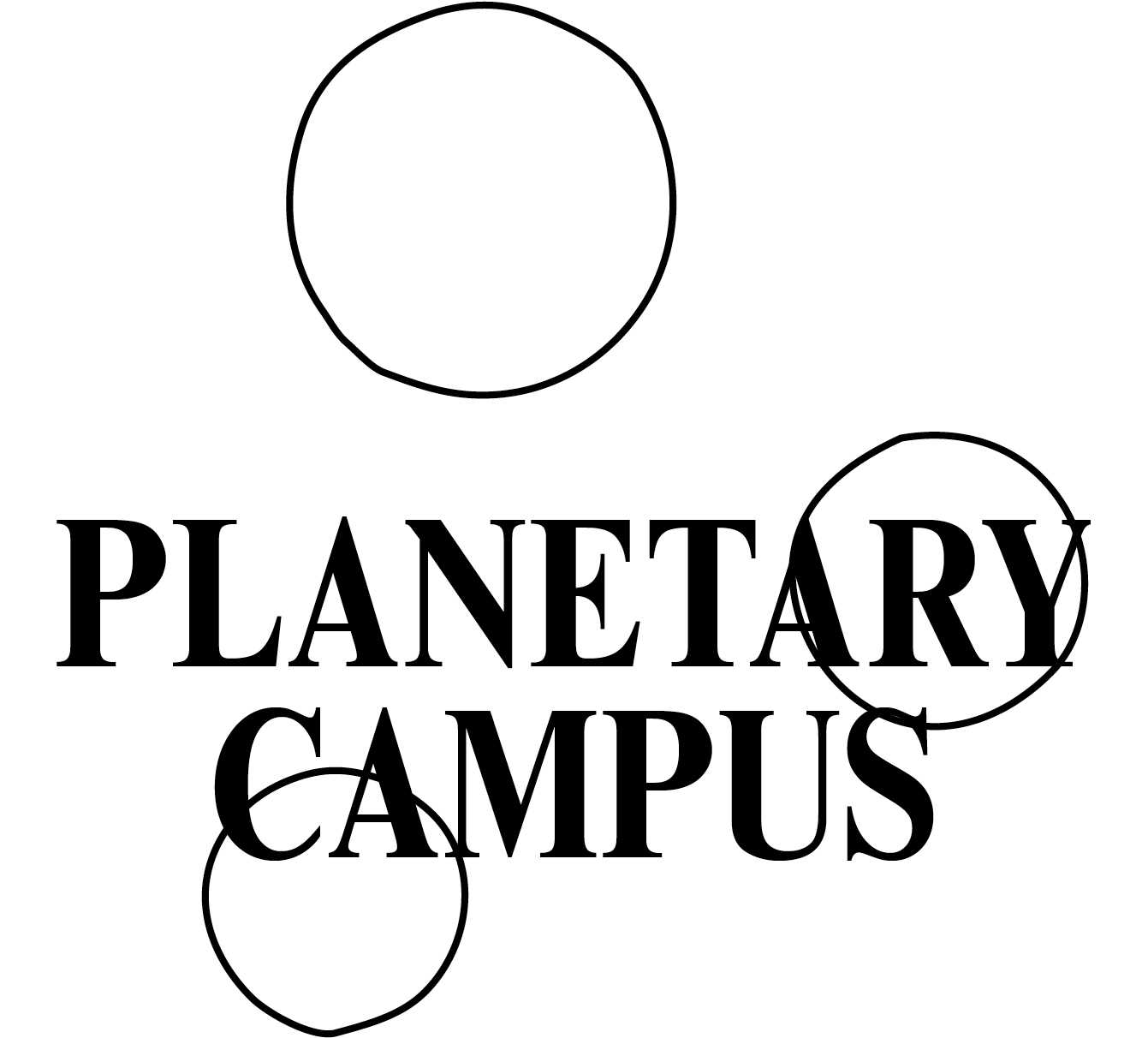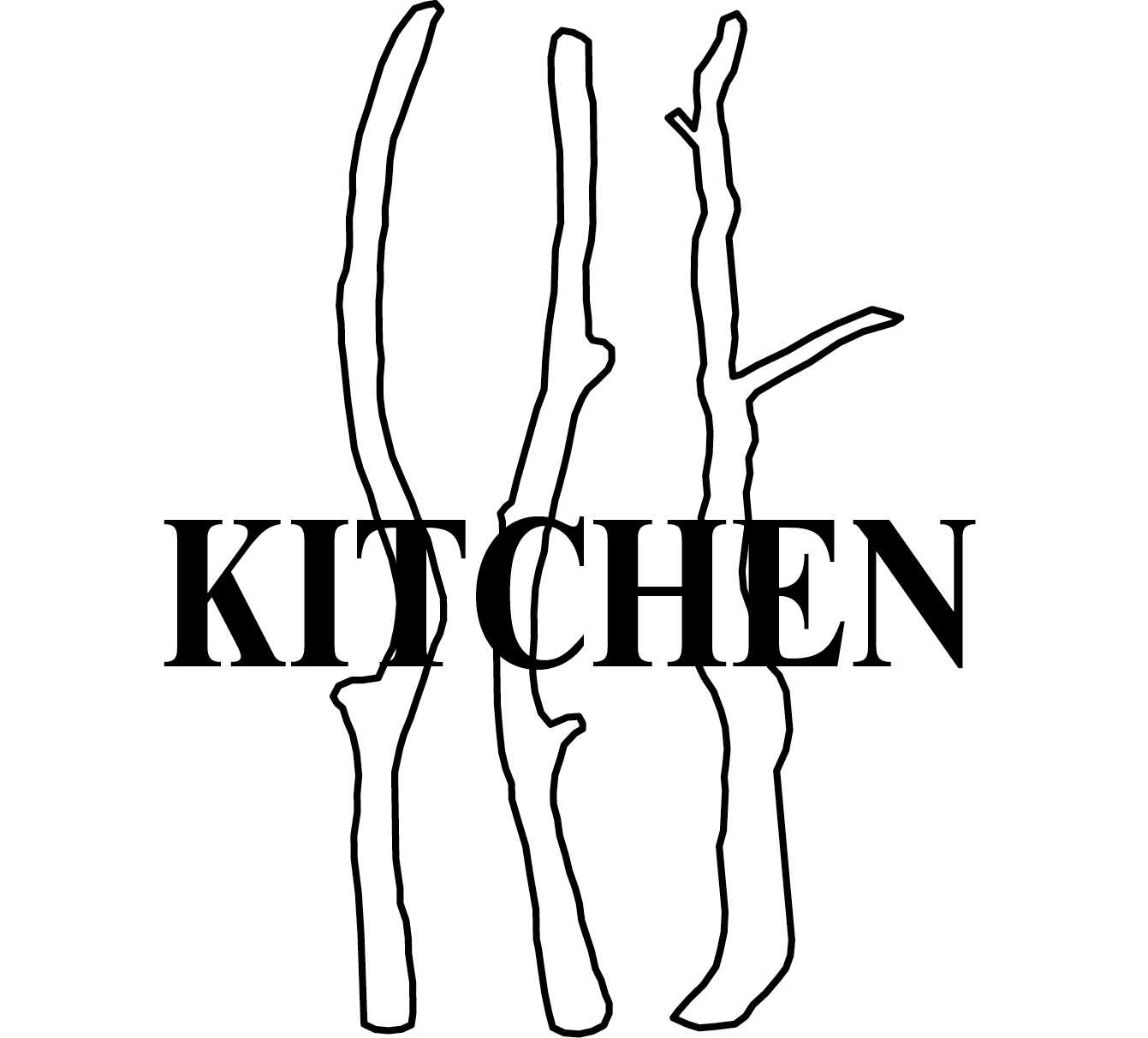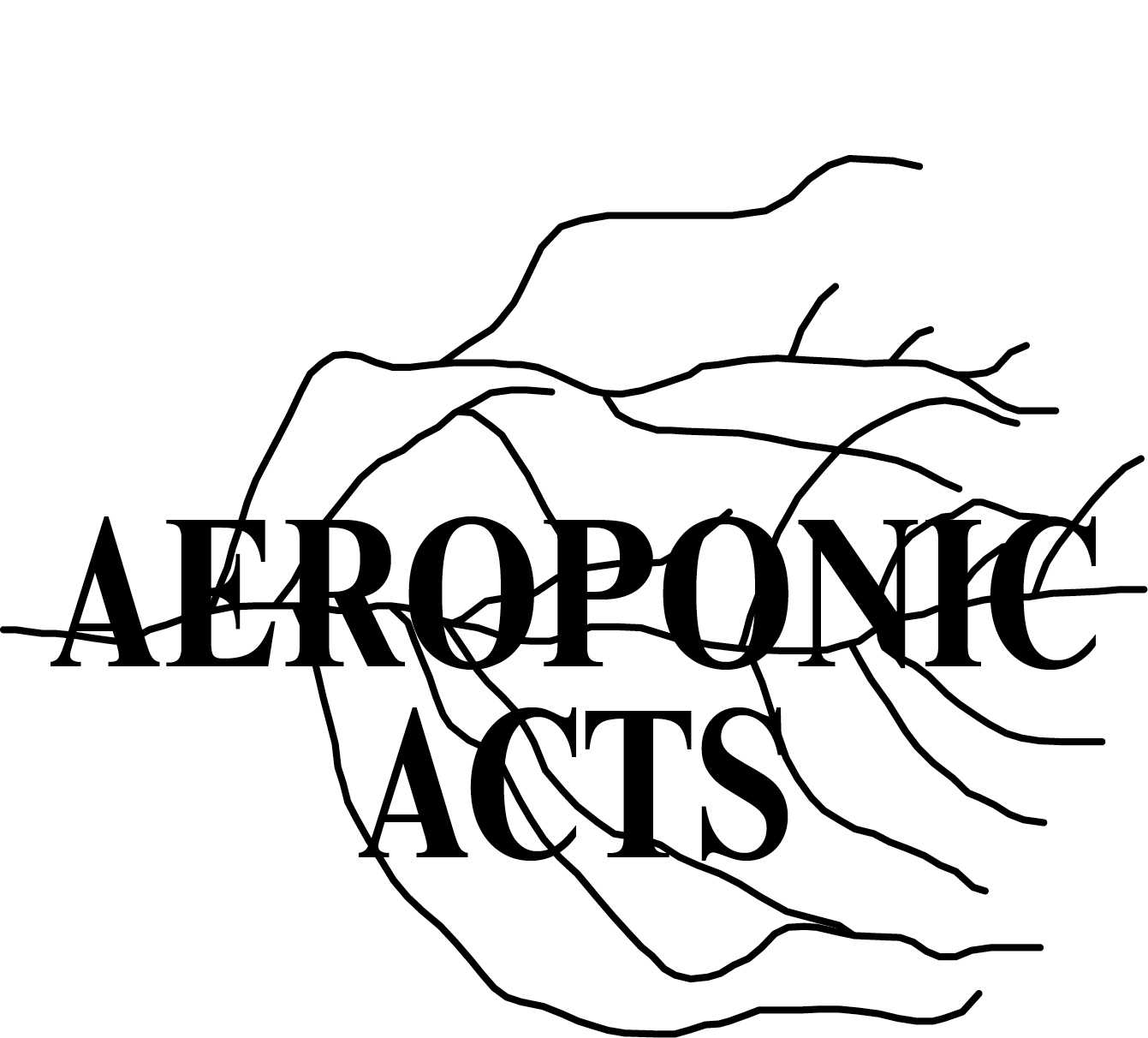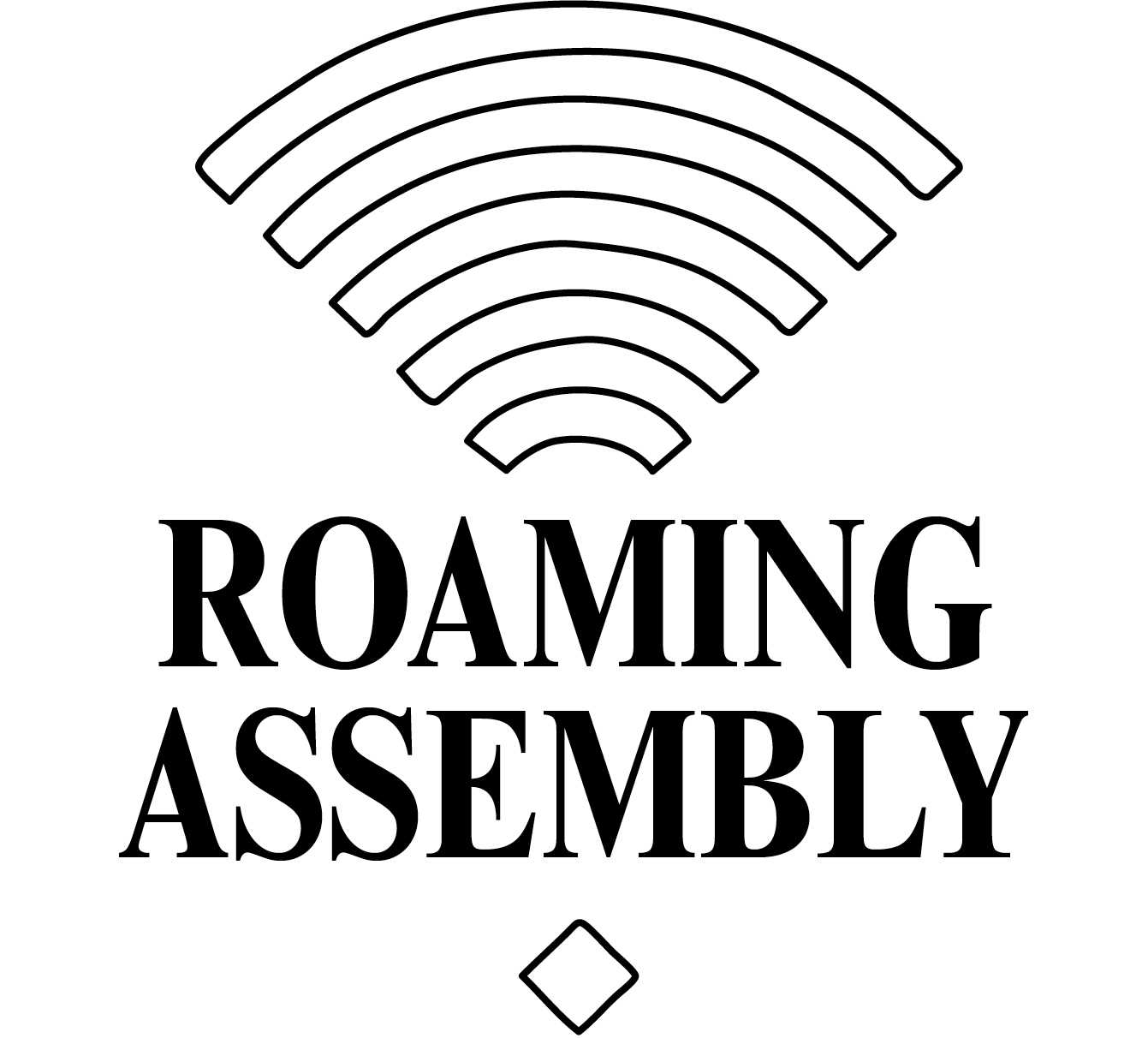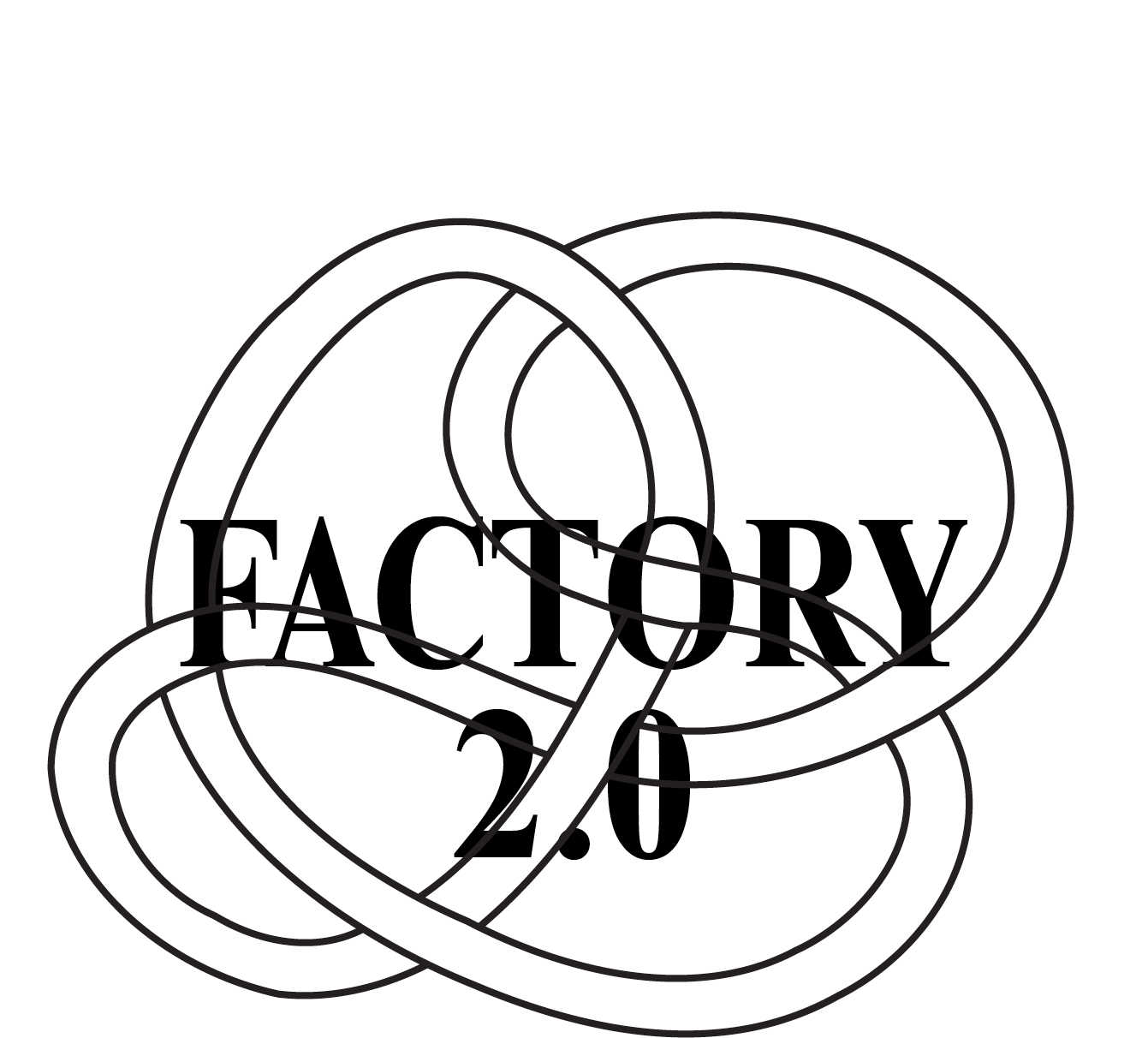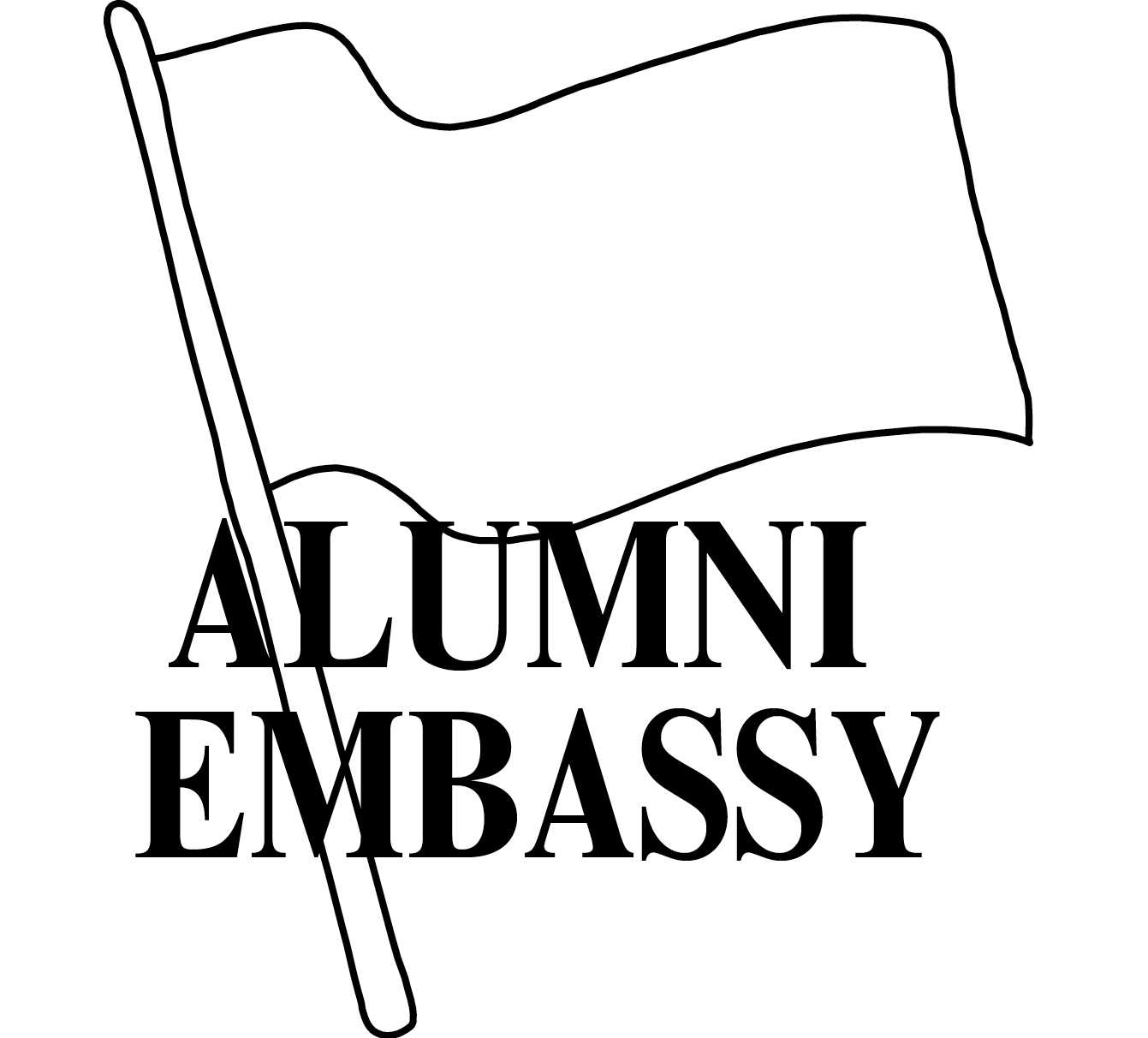Syllabus 2020-2021
Dutch Art Institute a.k.a. DAI Roaming Academy stands for the entirety of our program; including its public events, archives, alumni community and so forth. We foster study by means of performance, reading, writing, voicing, making, listening, curating, commoning & conviviality.
DAI Art Praxis stands for our accredited MA course; with the syllabus of the year at hand.
DAI Art Praxis stands for a two year long study trajectory. Upon succesful conclusion a total of 120 ECTS will be awarded, of which 60 ECTS have to obtained during the first year of study. It is possible to allow for more time to write the thesis. One should however be aware that a (partial) third year also means official re-enrolment and the tuition fees that come along with that. You are however not required to pay for the entire year, but only for as much months you need in order to finish the work and then to graduate.(if you are currently studying at DAI and left with questions in this regard you are welcome to contact Rik Fernhout)
DAI Art Praxis is a permaculture, a balanced, finely tuned blend of consistency and contingency that allows for a thoughtful integration of state-of-the-art research within the required competencies and learning objectives that come with our status as a fully accredited, so called Master of Arts in Fine Art and Design under Croho registration 49114 (read more here)
THE ACADEMIC YEAR 2020-2021
During the introduction week in September /October 2020 the director and the senior program coordinators have presented the framework of seminars and study groups with their corresponding methods of 'working together', to our student body. DAI explicitly asks its tutors to work with a model based on reciprocity. The regular tutors fuel and underpin a ‘curated class’ departing from research questions and study propositions, while the students are invited to contribute to the conversation with their artistic and /or theoretical research. Both students as well as tutors are expected to be open to new questions, to new insights and propositions – tutors take on leading roles, but can occasionally delegate this duty. Regular tutors, similar to students, are invited to make use of the DAI context to further their enquiry into things that matter to them. DAI considers this to be a crucial aspect of its mission.
In addition to collective work sessions, face to face advisory meetings geared towards tailor made, individual support for each student, will also be organized within the framework of our 3 modules:
Please find the descriptions to these curriculum components below. First and second year students will study and work together in all 3 modules, with thesis writing as the sole exception.
COMPONENT A:
COOP study groups
1st & 2nd year students:
*active participation in & productive contributions to collaborative artistic research trajectories.
*240 contact hours during DAI Weeks
*320 hours of self-study outside of DAI Weeks
*The students presence is required for 90% of the contact hours of the study module during DAI Weeks (it goes without words that 100% attendance is ideal !)
*Compulsory Choice | 20 ECTS per year
Five COOP study groups are at the heart of the DAI's curriculum. The COOPs ask for active participation in & productive contributions to, curated, cooperative, un-disciplined, study trajectories. Each COOP study group brings tutors and students together around a well-defined and relevant question or proposition.
In the academic year 2020-2021 every DAI-student will join one out of 5 study groups. The study groups have been developed in response to a commission from the part of DAI: for each study group a carefully selected partner organisation has been invited to convene a solid tutorial team, whereby artistic, curatorial, pedagogical and theoretical insights, knowledges, experiences and intuitions should be exquisitely balanced.
The 2020-2021 study groups will gather for several days during each DAI Week to share research and to develop group works. Ideally these group works are entirely collaborative endeavors, but if that is too hard to achieve they may also be the umbrella for more or less individually produced contributions, meaningfully assembled by the study group.
Gatherings can take the form of, a seminar, presentation (group or individual), reading group, walk, site visit, boot camp, laboratory, screening, interview, exhibition, examination, ritual, meditation, party, work out, exercise or otherwise. Face to face meetings with one ( or two) of the tutors will be organized on a regular basis, in order to help the individual student to establish viable connections between their praxis and the specific field of enquiry of the study group.
A study group's modus operandi is guided by an overarching question or proposition to which both tutors as well as students will respond with aural, visual, tactile, performative, digital, cinematographic, choreographic, designed, curatorial, textual, theatrical, theoretical and practical musings and findings (along guidelines formulated by the tutorial team). Input to the gatherings will have to come from all involved ( students, tutors, guests). Students can be asked to prepare presentations and to lead specific sessions.
Students should invest generous time, in-and outside DAI Weeks, as well as practical skills and knowledge (building, documenting, reporting, communicating, administrating etcetera) in realizing both the chronicles as well as the final group work.
In 2020-2021 the DAI has introduced an experimental cross-over between the COOPs and another curriculum component, namely HTDTWT. On 6 days, spread over the academic year, DAI’s six theory tutors will be hosted by DAI’s five COOP study groups. The theory tutors are invited to participate in, and to contribute to, the study topic of a specific COOP. Read more here: Protocol COOP Hosting & HTDTWT Guesting.
Chronicles are online containers, collectively curated, moulded, sculpted and choreographed by the student participants in the COOP study groups to be published on the DAI’s website. Textual, visual and aural notes echo day to day encounters during each DAI Week gathering. Taking shape by diverse forms and styles of mediation, they exist as fragmented, artistic and lively modes of archiving how knowledge was produced and shared; thus, building a student led mnemonic reservoir. See examples here.
The tutorial teams will take care of guiding the group towards the public presentation of a group work during COOP SUMMIT 2021. The final group work can be an action, a book, a website, an exhibition, a film, an opera, a play, a (group) performance, a combination of all these or otherwise.
The five 2020-2021 COOP study groups are:
* Reframing Climate Colonialism: Pleasuring the Radical Imagination.
* Curating Positions: Bodies and Antibodies in Cinema.
* On Tradition – Future Ancestors: let rhythm be your guiding light.
* CHUSMA 2.0: A Coalition of Gossips.
* ReSituating and ReCalibrating Hostipitality.
Assessment:
Individual midterm evaluations are student led, in conversation with the tutorial team.
Research, underpinned by strong individual efforts, will be materialized in group works: the regular chronicles and the final work to be presented during the COOP SUMMIT.
Individual input to the collective output will be assessed by the tutorial team - at the end of the year long trajectory.
Component A is concluded successfully when the student is accredited with at least a ‘satisfactory’ by the projects tutorial team for the overall review
Evaluation: insufficient (=5), satisfactory (=6), very satisfactory (7=), good (=8), very good (=9), excellent (=10).
COMPONENT B:
How To Do Things With Theory
1st year students:
*participation in seminars, academic writing course & thesis proposal
* 78 contact hours (including academic writing course)
* 538 hours of self-study
* The students presence is required for 90% of the study module during DAI Weeks (it goes without words that 100% attendance is ideal !)
* Compulsory Choice | 18 ECTS
2nd year students:
* participation in seminars & finalization of a written thesis (2nd year)
* 70 contact hours (including face to face meetings)
* 546 hours of self-study
* The students presence is required for 90% of the study module during DAI Weeks ( it goes without words that 100% attendance is ideal !)
* Compulsory | 22 ECTS
How To Do Things With Theory (HTDTWT) is a two year study trajectory designed to help students to develop skills to formulate relevant questions related to theory, which strengthen their praxes, and allow them to position their work in broader contexts. The trajectory consists of a series of lectures, seminars and reading sessions guided by the tutor as well as individual tutoring. The final outcome of HTDTWT is a written thesis. Supported by face to face coaching, the student is expected to bring forward a theoretical question arising from, and therefore closely related to their praxis. Both theoretical research as well as academic writing skills, always in some relation to their praxis, will be furthered.
At the end of the first year, the student submits a written thesis proposal for the writing of the thesis in the second year. The thesis must be supported by a concentrated reading of at least six titles and should have a length of between 10.000 to 15.000 words (including footnotes and bibliography). Theses with the absolute minimum of 8.000 or the absolute maximum of 17.000 words will only be accepted after agreement of the involved theory tutor.
The thesis must be presented in English and will be evaluated by the student's HTDTWT tutor and the HTDTWT coordinator. Exceptionally the given format of the thesis can be adapted to specific needs or abilities, always only after written permission from the mentoring tutor and the head of program. It is not allowed to hand in an older thesis, a text written in a different (educational) context, nor is it allowed to re-use texts produced in the context of another DAI Art Praxis component.
During the first year all students take part in an academic writing course (6 sessions), which will look at: formulating arguments and presenting data, organisation and coherence throughout a text, writing clear and concise paragraphs, structure and discourse as well as the use of sources (summarizing, paraphrasing, quoting, and referencing).
The six HTDTWT Seminars 2020-2021 are:
* Writing Sound/Sound Writing: Resonating Materialities II
* The Life and Afterlife of Fascism
* Witness
* The Subaltern and the “Free Negro”: Postcolonial Criticism, Afro Pessimism and the Intersectionality
An integral part of this curriculum component are the How To Undo Things With Theory events, which every student must attend.
Assessment:
At the conclusion of the first year, each student will be assessed by the HTDTWT tutor and the HTDTWT coordinator on "research & participation” in the seminars (including the academic writing course), and “research & writing" for the thesis proposal. Both assessments are brought together in an overall assessment.
At the conclusion of the second year, each student will be assessed by the HDTWT tutor(s) and the HTDTWT coordinator on “participation and research” in the seminars, and on “research and writing” for the thesis. Both assessments are brought together in an overall assessment.
Component B is concluded successfully when the student is credited with at least a ‘satisfactory’ by the tutor(s) in the overall assessment.
Evaluation: insufficient (=5), satisfactory (=6), very satisfactory (7=), good (=8), very good (=9), excellent (=10).
COMPONENT C:
PLANETARY CAMPUS
1st & 2nd year students:
* 211 contact hours in total (this includes attending presentations by other students)
* 293 hours of self-study in total
*The students presence is required for 90% of the contact hours of the study module during DAI Weeks (it goes without words that 100% attendance is ideal !)
* Compulsory |18 ECTS
The Planetary Campus is an innovative conceptual space where the MA curriculum "DAI Art Praxis" opens up to a wide variety of productive encounters with external and internal positions and interests. The Planetary Campus aggregates interfaces between academic and artistic researchers, between the academy and the world, between DAI-students and DAI-alumni as well as between DAI-students and the DAI as institutional framework. Here, perspectives on co-production and co-creation, on orality and performance, research and publicness, and on the politics and the poetics, the ethics and the aesthetics at, and of the DAI (and beyond) can be explored through a variety of formats, such as:
C1
The Kitchen
1st & 2nd year students:
*The student’s presence is required for 90% of the study module during DAI Weeks ( it goes without words that 100% attendance is ideal !)
During each regular DAI-week, one day is dedicated to acts, performances, screenings or presentations, or lecture-performances (recognized here as a longstanding unique discipline, a hybrid of research, lecture, visual art and performative narrative techniques) directed and steered by 11 (give and take) individual students (each month a different constellation of names). Each Kitchen Act of 20 minutes is authored by one student but may involve invited "others" as collaborators, assistants or audience-participants.
The Kitchen-format offers students the possibility to present/ activate their work and research updates, proposals, experiments and other relevant or urgent musings, in a context that is independent from the other constituents of the curriculum. For DAI, as a roaming academy without studio spaces, this is the platform where "praxis" in its broadest sense can be shared among the entire student body as well as with ‘outside’.
To guarantee that each student can have the full 20 minutes for their act + 20 minutes for the responses to their act, the Kitchen comes with a quite strict protocol. Beginning their presentation with a carefully crafted key question, each student presents work/research by means of performance, talk, performance-lecture, screening, reading, recital, choreography, play, concert, demonstration, action, presentation of relevant aspects of praxis or work in progress or process, reference sets or, a combination of (some of) these formats. Other than the limits of the given time and space frame and some basic curatorial rules there are actually no restrictions to the content and the format of the presentation.
Following each presentation, in a conversational mode, the invited respondents will try to engage with the presentation by means of an improvised, non-judgemental, raw, sketchy, tentative, spoken reflection, (roughly) guided by ‘the question’ as well as by the respondents' own concerns, interests and knowledges.
For the fourth and final presentation of the two-year trajectory, the so-called AEROPONIC ACTS, a public presentation space will be made available and the filmed documentation of the presentation/ performance will be published on the DAI’s website.
Assessment:
The Kitchen is a progressive study module. The two-year learning curve, including the AEROPONIC ACTS will be assessed by the Head of Program, carefully weighing the relevance, care, resourcefulness, creativity and acumen with which a student has managed to make use of this two-year trajectory, with the diverse comments of the various guest respondents over time, as a very important, informative back drop.
1st year students:
pass or fail
2nd year students:
The Kitchen & The AEROPONIC ACTS are concluded successfully when the student is accredited with at least a ‘satisfactory’.
Evaluation: insufficient (=5), satisfactory (=6), very satisfactory (7=), good (=8), very good (=9), excellent (=10).
*Compulsory | 14 ECTS
C2:
ROAMING ASSEMBLY
1st & 2nd year students:
*The student’s presence is required for 90% of the study module during DAI Weeks (it goes without words that 100% attendance is ideal !)
The Roaming Assembly is a recurring public symposium convened by guest curators; a state-of- the-art speculative and hybrid program exploring specific themes and topics of contemporary relevance to the thinking of art in the world today, a welcoming hub where art, research and production work are generously shared between, presenters and the public, where complexity can be embraced and intellectual intra-actions are fostered. In the academic year 2020-2021 Roaming Assembly is scheduled to take place at the beginning and at the end of the year - in both cases guest curated by the curatorial team of sonsbeek20-24. Although closely interlinked with the core issues addressed by the DAI's academic program, Roaming Assembly editions are not conceived as plain extensions of the regular DAI classes and seminars, but rather envisioned as sovereign happenings, designed to “mobilize our bodies, our intelligences” and to connect DAI to wider discourses.
Assessment:
Each student hands in a written reflection on the past Roaming Assemblies of Minimum 500 and Maximum 2000 words. The Planetary Campus Team will steer the evaluation: pass or fail
*Compulsory | 2ECTS
C3:
The Factory 2.0
1st & 2nd year students:
* The student’s presence is required for 90% of the study module during DAI Weeks (it goes without words that 100% attendance is ideal !)
Factory 2.0 offers the students time and space to engage with a variety of activities, either self-organised among students, or organised by, or together with the Planetary Campus Team, both on a structural base as well ad hoc. The Factory aims to actively involve students in organisational aspects of the Kitchen, the Roaming Assembly as well as to offer students agency and responsibility in relation to DAI’s modus operandi at large: as co-creator, communicator, co-producer, learner, listener, organiser, participant, performer, presenter, reporter, researcher and respondent.
A container of various undertakings, Factory 2.0 encloses the following initiatives and activities:
Weaver
Weaver is an initiative by the Planetary Campus team calling for the formation of group of students to engage on weaving the relational space among the curators and guests of upcoming Roaming Assemblies and the DAI community at large.
Weaver takes as a (given) starting point the conceptual and contextual parameters or each Roaming Assembly edition and knits the roof under which each symposium’s organizational components and its participatory/co-creative protentional are projected, propositioned and actualized. To that extend Weaver is envisioned as a small unit (with the possibility of temporal expansions/recruits) implementing a range of skill sets and assuming a variety of positions: learner, participant, recruiter, reporter, co-producer, co-organiser and host.
Student Led Activities
Embedded in the time frame of Factory 2.0, Student lead activities encompass all group initiatives and undertakings organized by the student body. Each DAI week and during the indicated time slots, DAI’s on-site facilities open up to enable the gatherings of existing student-organized groups.
Assessment:
In June the student hands in a brief self-evaluation of 200 - 500 MAX words, to be signed off by the Planetary Campus Team. Evaluation: pass or fail
1st year students:
*Compulsory | 2 ECTS
2nd year students:
*Compulsory | 1 ECTS
C4
Web-presence at the Alumni Embassy
DAI’s Planetary Campus extends far beyond the moment of graduation as DAI is committed to keep the conversation going – for this reason it is important to create (digital) spaces for reunion. The Alumni Embassy on the DAI website provides a curated platform from where former students can keep the DAI community, as well as DAI’s wider network updated on their activities. Shortly before their graduation all graduates are asked to share links to their websites (and /or social media in so far, they relate to their professional practice).
Assessment:
by the Head of Program of a student’s web-presence is limited to one competence: ‘Presentation & Communication’: do you do justice to your own praxis? Are your references and credits fair and up to date? As a “return upon investment” (we will publish you wherever we can, you will publish your Alma Mater) DAI asks graduates to include a link to the DAI website, in their cv or otherwise. Existing websites will be evaluated according to the same criteria.
Evaluation: Pass or Fail
2nd year only:
Compulsory | 1 ECTS

